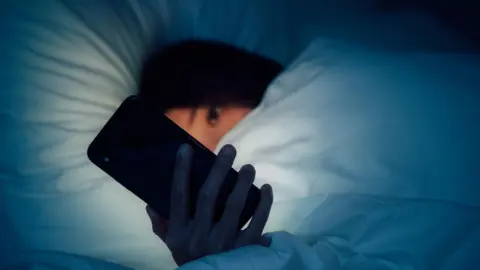Technology reporter
 Getty Images
Getty ImagesPeople who spend more time looking at a screen in bed are more likely to report insomnia and sleep loss, a study has found.
The research is based on a Norwegian survey of more than 45,000 students.
It indicates that each additional hour of screen time was linked to a 63% increase in insomnia risk, and 24 minutes less sleep.
However, the researchers said they had only established a correlation between screen use and lower sleep quality and had not demonstrated that the former caused the latter.
Experts say putting down your phone before bed, doing something relaxing and establishing a routine may help improve sleep.
The researchers behind the study, based on nationally representative survey data of 18-28 year old students gathered in 2022, wanted to examine the link between the amount of time spent using screens in bed and sleep patterns.
They also sought to probe the impact on sleep of using social media compared to other screen activities.
Dr Gunnhild Johnsen Hjetland of the Norwegian Institute of Public Health, who is lead author of the research – which was published in a Frontiers journal – said the type of screen activity appeared to be less impactful than screen time on the whole.
“We found no significant differences between social media and other screen activities, suggesting that screen use itself is the key factor in sleep disruption,” he said.
Sleep or social media
The 2022 Norway health and wellbeing survey asked participants to identify if they used any digital media after they had gone to bed.
Options included watching films or TV, checking social media, browsing the internet and gaming.
Among those saying they used screens in bed before sleep, 69% said they used social media as well as other screen-based activities.
Participants were also asked to identify how many nights a week they would engage with such media, and for how much time, as well as how often they had difficultly falling or staying asleep, waking up early or experiencing tiredness.
It identified those who said they experienced such issues at least three nights or days a week, for at least three months as experiencing insomnia.
While the study found a link between bedtime screen use and people reporting sleep disruption or insomnia, researchers say it does not mean it is a cause.
“This study cannot determine causality — for example, whether screen use causes insomnia or if students with insomnia use screens more,” said Dr Hjetland.
They also note that the study’s reliance on survey data of self-reported experiences may mean it contains biases, and its findings should not be considered globally representative.
Joshua Piper, a sleep clinician at ResMed UK, said the study provided “valuable, mounting evidence” of electronic device use negatively impacting sleep.
“It steals both opportunity and the quality of your sleep, which is why some may struggle for onset, others struggle to stay asleep,” he told the BBC.
While people may try to mitigate the impact by adjusting screen brightness or using night mode, Mr Piper said previous studies suggested it was scrolling and engaging with a device that was likely to cause sleep disruptions.
Tips for better sleep
Insomnia is believed to affect as many as one in three people in the UK.
The sleep disorder is among a whole host of problems people have reported experiencing with sleep – with late night phone use and doomscrolling often blamed.
While common practice, the actual impact of using social media or scrolling through online content in bed on physical and mental health remains contested.
Still, experts recommend that people stop using digital devices shortly before trying to go to sleep.
They also say establishing a routine by going to bed and getting up at the same time every day may help improve sleep.
Mental health charities Mind and Rethink recommend trying to do something relaxing before going to sleep such as breathing exercises, reading a book or having a bath, rather than trying to force yourself to sleep.
They also suggest avoiding caffeine, alcohol or large meals before bed, doing gentle exercise and trying to make your bedroom more comfortable, where possible.
Sleep therapist Dr Kat Lederle told the BBC that getting exposure to natural daylight, particularly in the morning, was vital to help regulate our internal body clock.
She said finding ways to “let go of the busy, thinking day”, such as by doing an enjoyable activity that is not too stimulating, can also be key to better sleep.
The authors of this study echo the need for further research into the subject, including longer-term monitoring of sleep patterns as well as investigations into areas such as the disruption caused overnight by device notifications.
“Together, such efforts could clarify the impact of bedtime screen use on sleep and inform targeted recommendations for students and other populations,” they conclude.






